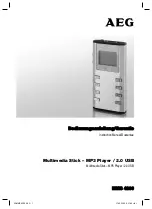
www.naxa.com
Page 27
ing structure,grounding of the lead-in wire to an antenna-discharge
unit, size of groundingconductors, location of antenna-discharge
unit, connection to groundingelectrodes, and requirements for the
grounding electrode (see figure).
15. Lightning: For added protection for this product, unplug it from the
walloutlet and disconnect the antenna or cable system during a
lightning stormor when it is left unattended and unused for long pe-
riods of time. This willprevent damage to the product due to lightning
or power-line surges.
16. Power Lines: An outside antenna system should not be located in the
vicinityof overhead power lines or other electric light or power cir-
cuits, orwhere it can fall into such power lines or circuits. When in-
stalling an outsideantenna system, extreme care should be taken to
keep from touching suchpower lines or circuits, as contact with them
might be fatal.
17. Overloading: Do not overload wall outlets, extension cords, or inte-
gral conveniencereceptacles as this can result in a risk of fire or elec
-
tric shock.
18. Object and Liquid Entry: Never push objects of any kind into this pro-
ductthrough openings as they may touch dangerous voltage points or
shout-outparts that could result in a fire or electric shock. Never spill
liquid of any kindon the product.
19. Servicing: Do not attempt to service this product yourself as open-
ing orremoving covers may expose you to dangerous voltage or other
hazards.Refer all servicing to qualified service personnel.
20. Damage Requiring Service: Unplug this product from the wall outlet
and referservicing to qualified service personnel under the follow
-
ing conditions:a) when the power-supply or plug is damaged; b) if
liquid has been spilledor if objects have fallen into the product; c) if
the product has been exposedto rain or water; d) if the product does
not operate normally by following theoperating instructions. Adjust
only those controls that are covered by theoperating instructions as
improper adjustment of other controls may resultin damage and will
often require extensive work by a qualified technician to restore the
product to its normal operation; e) if the product has been dropped or
damaged in any way; f) when the product exhibits a distinct change in
performance—this indicates a need for service.
21. Replacement Parts: When replacement parts are required, be sure
thatyour service technician has used replacement parts specified
by the manufactureror have the same characteristics as the original
part. Unauthorizedsubstitutions may result in fire, electric shock, or
other hazards.
22. Safety Check: Upon completion of any service or repairs to this
product,ask the service technician to perform safety checks to ensure
that the productis in proper operating condition.
Summary of Contents for NPD-1003
Page 32: ......






































